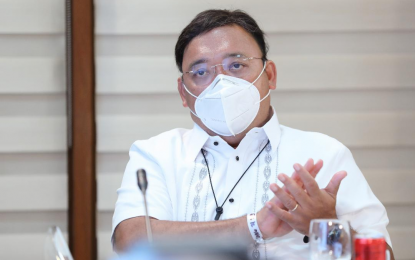
Senatorial aspirant Harry Roque (File photo)
MANILA – UniTeam senatorial aspirant Harry Roque wants to reintroduce measures that protect witnesses to show the government's commitment to prosecuting serious crimes such as those related to the war on drugs perpetrated by the police.
Roque said he would refile bills such as the Witness Confidentiality Act and the Whistleblower Act as part of his legislative priorities for the Senate should he win in the May national elections. These bills would give more legal protection to civilian and police witnesses.
The former member of the 17th Congress cited the 52 “drug war-related cases” being investigated by the National Bureau of Investigation (NBI) for possible filing of criminal charges against erring police officers.
Roque is monitoring the case build-up, claiming "the state is obligated to give domestic legal remedy to victims of human rights violations and heinous crimes particularly if law enforcers are involved."
"The investigation might be stonewalled by the fact that most of the key witnesses are police officers themselves," he said in a news release on Tuesday.
"We cannot file criminal cases against police officers and officials responsible for the extralegal killings of drug suspects unless their fellows in the police force come forward and testify," he added.
In 2021, the Department of Justice (DOJ) released an information matrix on the 52 cases to encourage witnesses to approach the NBI.
The justice department also notified relatives of deceased suspects that criminal liabilities of involved police officers are being determined.
"To successfully resolve such cases, we should ensure the legal protection and security of whistleblowers, including law enforcers, who disclose wrongdoings in the government or private sector," Roque said.
Roque's proposed legislation is the Witness Confidentiality Act (House Bill 1460) that safeguards a witness' contact details such as residence address, business address, and telephone numbers.
The information, he said, should not be disclosed in any hearing unless the court says otherwise. The burden to establish the need for the information shall also be on the defense or party seeking disclosure."
He would also refile the Whistleblowers' Protection Act (House Bill 223) that protects whistleblowers, whether private citizens or government officers, from retaliatory acts.
Roque said a retaliatory act is any action that adversely affects the rights and interests of a whistleblower taken by an employer, superior, or agency head.
Such action shall include whistleblowers' discharge, suspension, transfer, or demotion. It also refers to reducing or withholding their salary, benefits, and bonuses, Roque added. (PR)
